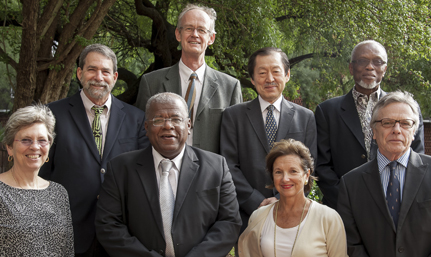Latest News Archive
Please select Category, Year, and then Month to display items
07 March 2024
Photo Lunga Luthuli
 Prof Francois Strydom, Senior Director at the Centre for Teaching and Learning and Simphiwe Kunene, the first African DREAM scholar and a master’s student from the Faculty of Education.
Prof Francois Strydom, Senior Director at the Centre for Teaching and Learning and Simphiwe Kunene, the first African DREAM scholar and a master’s student from the Faculty of Education.
The University of the Free State (UFS) received recognition for its commitment to student success at the 2024 Achieving the Dream (ATD) conference which celebrated its 20-year anniversary. Simphiwe Kunene, an Education master's student originally from the Qwaqwa campus, was selected to represent South Africa as the first DREAM scholar from Africa as part of the conference.
The Achieving the Dream network of over 300 institutions, which is one of the largest movements in US higher education aims to transform colleges and universities so that students of colour and a lower socio-economic status are supported to earn a degree. The UFS is a leading partner in the Siyaphumelela Network, which has been working for 10 years with ATD to enhance the success of students in South Africa. Prof Francois Strydom, Senior Director at the Centre of Teaching and Learning (CTL), accepted the award on behalf of the institution.
Prof Strydom said that collaboration with the ATD and Siyaphumelela institutions has helped the UFS to develop cutting-edge approaches to “level the playing field” and support Kovsies to earn their undergraduate degrees.
The first African DREAM scholar
Kunene was selected as the first African DREAM scholar from the Siyaphumelela network. To select the DREAM scholar, each Siyaphumelela partner institution nominated one student as a preferred candidate. From the proposed candidates, the DREAM scholar was selected by the South African Institute for Distance Education (Saide) based on the following: demonstrating resilience, academic excellence, and a deep commitment to making a positive difference in universities and personal communities.
He addressed the conference of over 2 000 delegates and shared with them his hopes and dreams. Many members of the South African delegation said Simphiwe did his country proud. He had the following to say about his opportunity to be a DREAM scholar: “Being a DREAM scholar was life changing for me, exposing me to an array of opportunities I never knew were possible and available for me. It was as if, for a moment, the world had stopped to just listen to what I had to say."
The way forward
The UFS will continue its work as a partner of the Siyaphumelela network for the 2024-2026 cycle. The multi-stakeholder project team is focused on enhancing undergraduate students’ time, and to position the UFS as a thought and research leader in the area of student success as part of Vision 130.
Esteemed international Council advises the UFS
2013-03-26
|
 |
|
In front, from the left are: Prof Alice Pell, Vice-Provost for International Relations, Cornell University in the USA; Prof Jonathan Jansen, Vice-Chancellor and Rector of the UFS; Ms Jane Evans, Director of Ntataise Early Child Development Network Support Programme in South Africa; Mr Gert Grobler, Ambassador of South Africa to Madagascar and alumnus of the UFS. At the back, from the left are: Prof Joel Samoff, Professor in African Studies, Stanford University in the USA; Prof Teuns Verschoor, Vice-Rector: Institutional Affairs of the UFS; Prof Masafumi Nagao, Project Professor at the Graduate School for Frontier Sciences, University of Tokyo; and Prof Akilagpa Sawyerr, former Secretary General of the Association of African Universities (AAU), Ghana. Ms Phumzile Mlambo-Ngcuka, former Deputy President of South Africa, was absent when the photo was taken.
Photo: Sonia Small
27 March 2013 |
The International Advisory Council (IAC) of the University of the Free State (UFS) is visiting the Bloemfontein and Qwaqwa Campuses this week as part of its biennial meeting with the university leadership. The Council, consisting of seven leading academics, business leaders and policy makers, are advising the leadership on how well we perform against international benchmarks in research, teaching, service and transformation. The Council also acts as advocates for the university in their own spheres of influence.